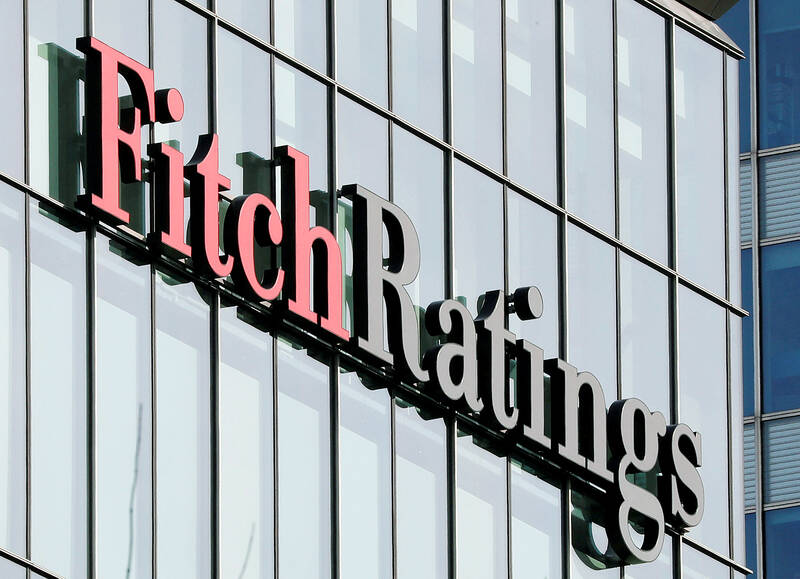The private banking sector might see modest loan growth and flat profitability this year, as monetary tightening at home and abroad help widen interest spread, boosting funding costs, Fitch Ratings Taiwan said yesterday.
“We expect Taiwan’s bank operating environment to remain stable,” Fitch credit analyst Sophia Chen (陳怡如) said, adding that the economic slowdown reflects subdued external demand for Taiwan’s electronics as well as information and communication technology products.
Fitch is projecting economic growth of 2 percent for Taiwan this year, but might trim it next month if major economic barometers fare worse than expected, Chen said.

Photo: Reuters
Taiwan’s exports and export orders both fell for an eighth consecutive month last month, slumping 13.3 percent and 18.1 percent respectively from a year earlier, official figures showed.
A recovery could take hold in the fourth quarter, allowing the economy to grow 2.5 percent next year, she said.
The Directorate-General of Budget, Accounting and Statistics in February downgraded its GDP growth forecast to 2.12 percent for this year from the 2.75 percent it predicted in November last year.
It is scheduled to announce an update of its forecast on Friday.
Still, the local banking sector enjoys a stable outlook, backed by loan growth of 5 to 6 percent, continued margin improvement and recovering fees, which might offset a rise in bad loans from relief lending to small and medium-sized enterprises during the COVID-19 pandemic, and overseas operations, Fitch credit analyst Cherry Huang (黃嬿如) said.
Taiwanese banks limit most of their lending in overseas markets to Taiwanese companies, but also take part in syndicated loans and loans to foreign clients, she said.
Foreign borrowers pose higher risks and local lenders have adopted a cautious approach as evidenced by their declining exposure in China, she said.
Bank failures in the US are unlikely to affect Taiwanese banks given their low exposure, Huang said.
The ill-fated Silicon Valley Bank, for one, is a financial partner of tech start-ups, but tech exposure is smaller than 10 percent among Fitch’s rated Taiwanese banks, she said.
The ratings agency expects the central bank to hike its policy rate by another 12.5 basis points later this year after raising it by 12.5 basis points in March and 62.5 basis points last year.
The trend has fueled money flows from demand deposits to time deposits, elevating funding costs, Huang said.
Any weakening in borrowers’ affordability due to rate increases should be limited, she said, as Taiwan’s monetary tightening is modest compared with that in the US and Europe, she said.
Low unemployment and a positive GDP should mitigate potential asset quality deterioration, despite the unwinding of relief loans over the next two years, she said.
Fitch views property assets in Taiwan as resilient, lending key support to the credit profiles of banks that have quite high property-related exposure at 36.7 percent at the end of last year, Chen said.

PROTECTION: The investigation, which takes aim at exporters such as Canada, Germany and Brazil, came days after Trump unveiled tariff hikes on steel and aluminum products US President Donald Trump on Saturday ordered a probe into potential tariffs on lumber imports — a move threatening to stoke trade tensions — while also pushing for a domestic supply boost. Trump signed an executive order instructing US Secretary of Commerce Howard Lutnick to begin an investigation “to determine the effects on the national security of imports of timber, lumber and their derivative products.” The study might result in new tariffs being imposed, which would pile on top of existing levies. The investigation takes aim at exporters like Canada, Germany and Brazil, with White House officials earlier accusing these economies of

EARLY TALKS: Measures under consideration include convincing allies to match US curbs, further restricting exports of AI chips or GPUs, and blocking Chinese investments US President Donald Trump’s administration is sketching out tougher versions of US semiconductor curbs and pressuring key allies to escalate their restrictions on China’s chip industry, an early indication the new US president plans to expand efforts that began under former US president Joe Biden to limit Beijing’s technological prowess. Trump officials recently met with their Japanese and Dutch counterparts about restricting Tokyo Electron Ltd and ASML Holding NV engineers from maintaining semiconductor gear in China, people familiar with the matter said. The aim, which was also a priority for Biden, is to see key allies match China curbs the US

Teleperformance SE, the largest call-center operator in the world, is rolling out an artificial intelligence (AI) system that softens English-speaking Indian workers’ accents in real time in a move the company claims would make them more understandable. The technology, called accent translation, coupled with background noise cancelation, is being deployed in call centers in India, where workers provide customer support to some of Teleperformance’s international clients. The company provides outsourced customer support and content moderation to global companies including Apple Inc, ByteDance Ltd’s (字節跳動) TikTok and Samsung Electronics Co Ltd. “When you have an Indian agent on the line, sometimes it’s hard

‘SACRED MOUNTAIN’: The chipmaker can form joint ventures abroad, except in China, but like other firms, it needs government approval for large investments Taiwan Semiconductor Manufacturing Co (TSMC, 台積電) needs government permission for any overseas joint ventures (JVs), but there are no restrictions on making the most advanced chips overseas other than for China, Minister of Economic Affairs J.W. Kuo (郭智輝) said yesterday. US media have said that TSMC, the world’s largest contract chipmaker and a major supplier to companies such as Apple Inc and Nvidia Corp, has been in talks for a stake in Intel Corp. Neither company has confirmed the talks, but US President Donald Trump has accused Taiwan of taking away the US’ semiconductor business and said he wants the industry back